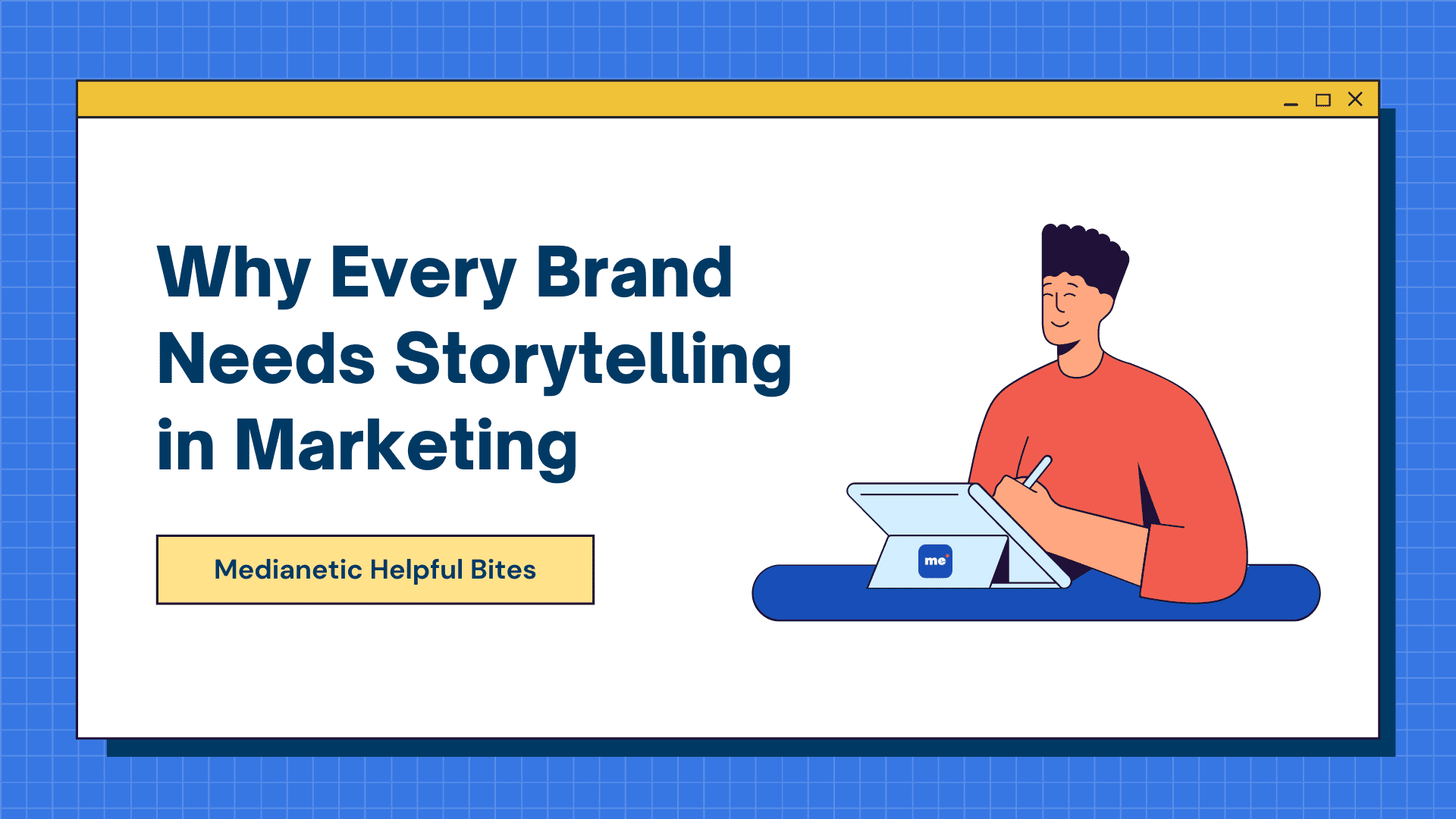
Storytelling has been a practice used by humans for thousands of years. In fact, our brains light up when we listen to engaging narratives. We all love a good story, and we all know a good story when we hear one.
Whether you work in marketing or not, you’ve probably seen that more industry experts and brands are focused on storytelling. In today’s digitally-reliant and overly-automated age, receiving a personalized touch is becoming more rare. Businesses that want to survive can no longer afford to go without a brand story or message. They need to connect with audiences on a much deeper level than before.
This is where brand storytelling comes in. Story-based marketing is changing the way brands are connecting AND building loyal relationships with their customers.
To be quite frank, this approach is more powerful than you might think.
But how does storytelling for marketing apply into your marketing strategy? Let’s take a look at what it means and dive into practical steps for putting storytelling marketing in action.

What does storytelling have to do with marketing?
As marketers, we’re always on the search for new ways to attract attention and convert this into action.
Studies have discovered that people remember stories 22x more than facts and figures, so storytelling can certainly assist you in boosting conversion rates.
Storytelling marketing is simply the use of a narrative to communicate a message to make the audience feel something–enough that it inspires them to take action.
It uses specific narratives that make your brand more interesting, personable, and showcase what your brand values most. Not only does it humanize your brand, but it helps consumers understand why they should care. Although originally storytelling was mostly in reference to film-making, it has since evolved to represent marketing and other content posted by brands. Brands can implement storytelling in images, videos, blogs, and etc. The beauty is that they can be told across an omni-channel strategy, which not only helps you cut down extra legwork, but it also builds overall brand message consistency.
A1: storytelling can help people relate on a personal-level to your business. This is a far deeper connection and can help build lasting relationships #semrushchat
— Brian Kato (@katobkato) October 16, 2019
Any marketer knows that branding and marketing go hand in hand. Storytelling is not different. This approach, at its core, aids in creating meaningful connections with your audience and helps cut through the monotony of daily advertisements.
Still don’t believe me? Here are 5 reasons why storytelling is an essential aspect to consider in your marketing strategy.
Stories make your customers care. By giving them a hero (or underdog) that they relate to, care about, and are rooting for, you are putting them in your ‘hero’s’ shoes.
Let’s view Adidas as a use case. The popular sports apparel company features a retiree–who was a former marathoner–yearning for freedom beyond the walls of his nursing home in this short ad. As he finds himself reliving his golden days, those memories slowly resurface and it motivates him to put on his old running shoes. With a bounce in his steps, he makes a sprint through the nursing home, but is eventually stopped by nursing home staff. However, he doesn’t give up. With a few more attempts and a little help from his friends, he finally breaks through the door and escapes into the glorious outdoors.
Adidas brought us along this emotional rollercoaster by placing us in the main character’s shoes. They inspired the audience to break free from the monotony of daily life. The message behind this story is clear: you can break free with the help of Adidas’ running shoes.
In the context of understanding your target audience better, empathy helps you put yourself in their shoes. You want to first consider their needs before pushing them for any other marketing initiatives.
When you draw out empathy through your storytelling, audiences are more likely to engage by sharing and become a customer.

As a brand interacting with your potential prospects, your relationships tend to feel very transactional. However, that’s expected–you do offer a service that your customer pays for. While consumers, without a doubt, want excellence and convenience in the products and services they buy, they’re also looking for a brand they can trust.
People like people. So when it comes to buying from brands that have similar offerings, they’ll often choose to buy from familiar brands or friends. That’s why building relationships is as important as perfecting your product or service. When you create content intended to serve their needs and connect with your audience, it feels less like a sales pitch.
Consider putting yourself in their shoes, who would you buy from? The brand who only directs sales pitches your way, or the brand that chooses to connect with their community to serve the customers’ needs?
Story-based marketing brings your brand to life and gives it that human touch. This makes your brand more relatable, approachable, and trustworthy. After all, customers want to feel valued, that you have their best interests in mind and make their purchases worthwhile.
Stories are captivating and they also convey messages easier.
Great stories inspire and encourage your audience to share it with others. When you create content that’s relevant, one that provides useful information, it is far more likely to be shared and remembered by others. Remember that stories are 22x more memorable than facts and figures!
Adding storytelling to your marketing strategy allows you to create optimal content for all sorts of platforms, as well as engage your audience that gets them to click that save and share button.
When you’re a business owner or marketing professional, one of the top priorities is to keep your website fully optimized for search engines, especially because it’s a cost effective way to market your business and brand.
What does storytelling in marketing have to do with SEO? They effectively boost your SEO by:
Content creation is pretty much the norm these days for brands and there’s a lot of noise to cut through if you want to stand out from the crowd. However, what sets you apart from them is your unique brand identity and brand voice.
Today’s customers are wiser at picking out authentic creators and brands from those who are not. So remember to use this to your advantage by being genuine in creating captivating storytelling content.
Great stories start with great ideas, but that’s not all there is to building a strategy that yields business results.
Here are some tips for making sure your stories resonate with your audience and propel your brand towards success.
The best kind of storytelling from brands are those that are authentic, genuine, and true to the storytellers-in this case, it’s the brands.
Use your narratives to convey your most important brand messages with emotional nuance to add a unique, personal flavor. You can do this as fun, distinct, serious, or humorous as you like. Just remember to be genuine and relevant to your overall brand voice.

As with all other marketing initiatives, our strategies go hand in hand with data. Although storytelling enables you to be creative in your niche, you must not forget the facts that you already know about your existing or potential target audience.
One of the ways you can let data be your guide, is to go back to your buyer persona in your digital marketing strategy. Try asking yourself these questions:
Remember to tailor your stories to your chosen audience in order to connect with them effectively.
Another point to consider is how this correlates with your marketing goals. By keeping track of your results, you’ll gather proven data on the metrics that were successful before to use as a guide for future efforts.
Storytelling marketing combines the power of a good marketing story with innovative modern tools to reach a target audience on a new level. Storytelling is one of the best ways to capture attention, sustain interest, and inspire action. Stories have the ability to cut through inauthentic noise and help you build meaningful relationships with your audience. Therefore, it’s a valuable skill that must be learned and mastered if brands are to truly stand out from the sea of competitors.
Everyone has a story to tell. What’s yours?
If you’re having trouble finding yours, we can help! We are experts in content creation, branding, storytelling, and digital marketing. Get in touch with us at hello@medianetic.me, call us at +603 7960 3088 or drop us a message via our chatbot below.

Medianetic Sdn Bhd
200301016995 (619415-K)
No. 59, 2nd Floor, Block E, Zenith Corporate Park, Jalan SS7/26 Kelana Jaya, 47301 Petaling Jaya, Selangor
hello@medianetic.me
+603 7960 3088 (Office)
Medianetic Sdn Bhd © 2023
Made by Medianetic